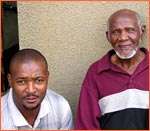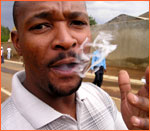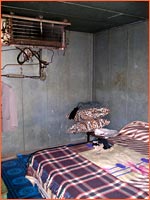 |
Wednesday, March 16, 2005
I've been taking a ton of pictures. I worry that sometimes my sound gathering suffers because I'm too focused on trying to get a certain shot. Like when the inflated condom was being batted around the crowd at Vaal and would rise, like an oblong moon, above the barbed wire. I tried to get that shot maybe 20 times. Never came out.
I met with Mapaputsi today. Picked him up at his townhouse apartment about 40 minutes south of Johannesburg. It's modest but not humble. Nice fluffy yellow couches. A little kitchenette. Less than I thought he might live in. Less than Osikdo, who has this big house in Gallo Park with a studio in it and everything. But not too shabby. I'd rented an Avis chauffered car. We piled into it with Paps's assistant Peter, who also grew up in Zola, and took off.
Paps talks about God a lot, and speaks in truisms sometimes. But he also explained well what it was like growing up in Zola. Both Peter and Paps told me that white people had a nickname for Zola back in the day. They called it "Beat Him To Death." That's what they were worried would happen there. I asked if people had, in fact, been beaten to death in Zola and Paps said "No. They used to stab them. Before the guns." Paps didn't do any of that, though, he says. He ran with those guys but he hung back when they'd start doing something illegal, tried to stay on the periphery and not get involved. After high school, they'd rap on the corner. Literally rap on the corner. And his signature song, Izinja, was the second song he wrote. I asked him to translate the first lines of it for me (which I couldn't recite to you to save my life, even though I've heard it maybe a dozen times). He said it means "Who let the dogs out." Just like that American novelty hit by the Baha Men. Except Paps was writing about the government releasing Nelson Mandela. "Like whites didn't know what they were in for?" I asked. "Thank you," he said. He always says "thank you" instead of "that's right."
 |
Mapaputsi and his "elder father" (i.e. his uncle) in Zola, Soweto.
PHOTO
GALLERY:
Zola, Soweto
|
Our first stop in Zola was Zola North where Mapaputsi has family. We stopped at this kind of low slung house. Not a knocked together tin shack like in some parts of Soweto but it was anything but glamorous. An old man with tight, shock white curls on his scalp and chin sat on a chair outside. Paps tried to explain to me several times how they were related but I couldn't figure out what he was saying. Turns out the man was his uncle, which in Zulu translates into something like "elder father." He's his mother's sister's husband. Families are that tight-knit that your uncle would be considered your "elder father." Or maybe it's just a trick of the language.
Then Paps bought weed. He wasn't shy about it. He said weed isn't drugs. Weed is a help. Rastafarians never hit each other, he says. They're mellow. It gets you in touch with "your inner you." (Which now that I think of it is the same kind of justification that a friend of mine from Belfast once made for drinking Guinness. "It builds you up," my friend said "Makes you strong. It's a food. They give it to people in hospitals." He repeated these same 14 words over and over and over again even after I had stopped listening.) Paps has a little chant for his weed habit. It goes something like "Weed. Weed-ah. Weed-ay." It sounds very Rastafarian even though he claims never to have been a Rasta. "I don't have a crown on my head," he said, meaning dreadlocks, "My crown is in my heart."
After chatting with the "elder father" for a minute, we walked back to this little outdoor alcove in the house. He exchanged a few words in Zulu with Paps's 16-year-old "nephew" (i.e. his cousin), a beautiful boy with two earrings. Then the cousin ran off, returning a few minutes later with a neatly wrapped, little, plastic bundle of marijuana.
 |
| Mapaputsi
|
"You must photograph me doing this thing," Paps said, "I wee-dee-dah! As I said. Weed wee-dee-dah." Then he laughed. He was sifting the pot around in his palm with the opposite index finger, finally breaking a filtered cigarette over the little meadow in his hand. "Do you want some dressing for that salad?" I said.
Paps smoked the whole joint down to its nub, explaining that he didn't advocate kids to smoke it. He said this because more than a dozen children were staring at us from the street: a 29-year-old celebrity smoking weed in their neighborhood and a white guy with a microphone recording him doing it. And Paps really is a celebrity. Peter explained to me at one point that Paps and Mandoza, and he himself by association, can't go anywhere, can't walk by themselves in a mall, can't take a bus ride without people recognizing them and talking. Everybody knows Paps in this area of course, or know of him, or so it seemed. He told me more than once "Don't worry. Nothing's going to happen to you when you're with me." Eventually he finished his joint and we climbed back into the rent-a-car. "We must go to my ghetto before the rain starts," he said. That is, the part of Zola where his parents raised him, Zola South.
 |
| Israel Montang, proprietor of a fruit and vegetable stand in Zola South, Soweto
|
I was half expecting him to take me to a shabeen (informal tavern, often in a private house) or just to a place where a group of his buddies all hang out on the street but he took me to an outdoor fruit and vegetable stand that his friend Israel owns. I say "owns." It's a couple of shelves with a corrugated tin roof over it. Beautiful apples though. Tomatoes in plastic. Clear unlabeled baggies of little crisps and other snacks. At first he was pretty upbeat about the place, about Zola in general. Yes it used to be rough, he said, but it's getting better. And yes people listen to kwaito. If you listen you'll hear it coming out of the cars that pass he said. But almost no cars passed. Zola isn't a place with a lot of cars. Or a lot of jobs, or technology or opportunity or money. They're finally paving the road Israel works on, 11 years after the ANC came into power. Other than that things haven't improved a lot in this area since democracy was instituted. After finding out a little more about what I was doing with all this tape, and after smoking a joint that Mapaputsi gave him, Israel became a lot more honest and a little belligerent. It started with this look, a kind of narrow-eyed resentful glare that worried me. It was like all of a sudden he was a different person and he said to me "Can I come in your country I want to be a sweep uppa your house." Not an actual request mind you, but a way of saying "you're the guy with something coming into the neighborhood with nothing and you're going to leave here in a few minutes and we're going to stay." I pretty much deserve that look, I thought. "We up sweep our own house," I said.
"Oh, you sweep up your own house," he said, "With your own hands. You haven't got a girl maybe or..."
"No," I said.
"Who's making for your garden," Israel said.
"No garden," I said.
"No garden?" he said "Oh. You're living in a flat?"
"Yup," I said. He seemed surprised but not that surprised. A flat is a lot more than he's got. For the next 20 or 30 minutes he talked to me about his daily fight just to remain alive. He doesn't have enough money for a license to sell his groceries. He barely has enough money for food. Where do you get money? he says. You have to have work. And there is no work. The government needs to create jobs. Things are changing but only "little, little, little." And anyway nobody wants to hire him because he's 46 and they think he's an old man. "If I showed you where I live," he said, "You won't believe it. And let me show you now where I live."
 |
| Israel Montang's room, which used to be a meat locker in a fish and chips shop.
|
Walked me down the sidewalk, as the rain poured down, into a gutted building that had been a business of some kind. I couldn't even figure out what it sold until he told me. It was a fish and chips shop. A huge pile of shoes sat in the corner by what had been the counter. He led me into his room, hesitating for a second to mess with the latch. Rain poured down on us through a hole in the roof. The door was huge and square and made of steel. I followed him inside and watched him light a candle. No lights. A big air conditioner-looking appliance hovered over his bed, which was spread with blankets of different patterns, plaid and striped, leopard print pillows stacked in the corner. A few times he had told me what the room had been but his accent was so thick I couldn't understand him. It sounded like "code room" or "coat room." It was "cold room." It had been a meat locker. Israel lived in a disused meat locker. His rent was two hundred rand a month, about forty dollars. All of that is breath-taking enough on its own. And then you think, someone is the landlord of this meat locker, charging Israel a good chunk of his sales for it.
Israel talked to me for a long time. A few times I tried to think of something to say in response, but everything I thought up sounded fatuous and borderline offensive "Yeah, I can imagine. It must be really hard." "I hear you. That's terrible. How do you manage?" So I just nodded and tried to make sure that I heard every word he said. Again, I was leaving Zola in a few minutes. And he seemed acutely aware of that. Money was so tight, he said at one point, that if he decided maybe he wanted to call me up to see how I'm doing, and he had 5 rand (about a dollar) to do so, he wouldn't spend that 5 rand on a phone call. He said he would buy bread with it. You can never relax, he said, you can never sit down and just rest. That's what poverty is. Every moment is a struggle to survive. And there are people worse off than him in Zola. And around the world.
I shook Israel's hand as we left, and kept shaking it, as if that might actually help him. "I hear the Europeans they say 'don't fail to try,'" he said "Keep on trying."
"That's right," I said, "Keep on trying."
And then he went into this run of saying it, as though he was explaining the essence of his life "Keep on trying. Don't fail to try. Try again. Keep on trying. Fine. See you when you see us again!" Another guy I had talked to, a 20-year-old, budding kwaito musician named Gottfried Smanga called after me "Remember us!" he said, waving "You must remember us."
"I will," I said.
Paps, Peter and our driver Patrick, who it turns out lives near Zola, and I all piled back into the car and drove back. Paps talked about having had his car stolen. I asked him who had done it and he said he couldn't tell me because they were in the industry and he didn't want to implicate them. The rain poured and poured down, making brown rivers in the lane that the minibus taxis use. "A mini tsunami," Mapaputsi said, laughing. He really does seem to have a way with language, and does seem to be a thinker. Talking about the people who've robbed him and who've robbed other kwaito singers, he said here are these people who support you and buy your CD and then they come and steal your car, when they're the reason you have the car. It's like they're taking their money back but in a different way. And because he had no car, he had no way to drive to his gig near Mozambique the next day. The promoter hadn't yet released the money for him to rent a car, he said.
When we got back to his place we sat in the car for a long time, sometimes in silence, sometimes with Paps just fretting and wondering what he was going to do. Then he said he didn't want to leave and check on the promoter again because it would mean letting Patrick go and he might need to talk to him. Paps and Patrick began talking back and forth in Zulu and then finally Paps turned to me and said didn't I want to know what Patrick was talking about. Somewhere in the back of my mind I was thinking, "okay, I'll bite."
"What did you say," I asked Patrick. Patrick said he had suggested that Paps borrow someone's credit card number, rent the car, and then deposit the money back into that person's account later on. I looked at Paps, who was looking at me. I almost couldn't bring myself to ask the question.
"You� you want me to do that?" I said.
"If it's possible," Paps said.
"I can't," I said "I'm sorry. I wish I could."
Paps and Patrick touched knuckles and rubbed their thumbs together as they said goodbye. As did Peter and Patrick. As it turns out Patrick has listened to Mapaputsi's music a lot. I wonder if it was a thrill for Patrick, meeting Paps. But for some reason I didn't ask him. I did give him a 50 rand tip as I got out of the car at my friends' suddenly opulent house in Saxonwold. Having done nothing to help Israel, and having done nothing to help Paps with his car situation. I figured I had to do something to help somebody. To give back in some way. It was a pathetic gesture I know. 10 bucks. But he did call me Seanie as I got out of the car. And made sure I didn't forget my notebook.
Really, the feeling I had looking into Israel's eyes was a kind of shame, and a feeling that he deserved to have someone stand in front of him and really try to understand every single word he had to say and not leave without having at least made an effort at trying to understand how difficult his life is. Like he said, "Don't fail to try."
NEXT ENTRY >>
|
 |





















